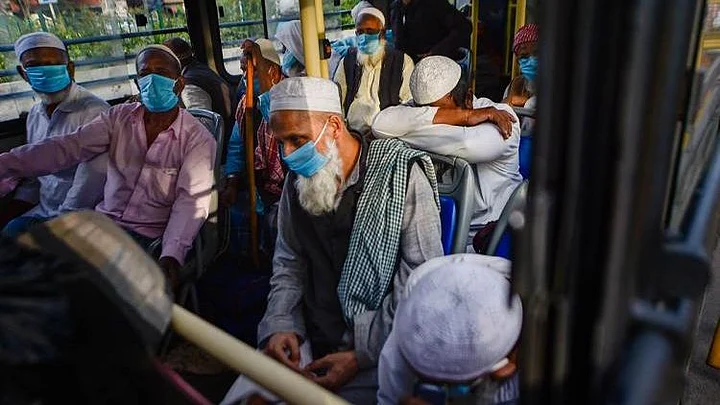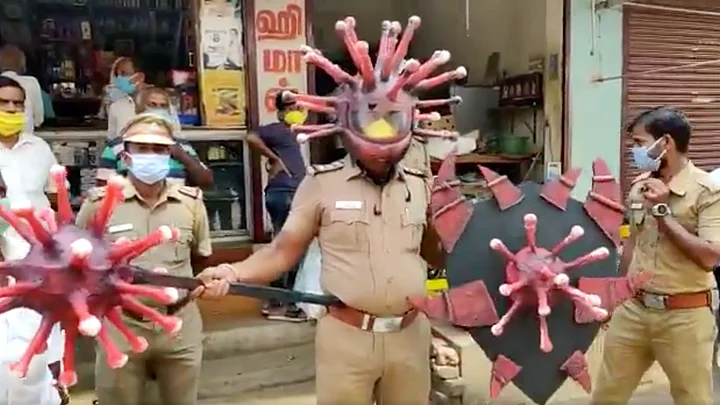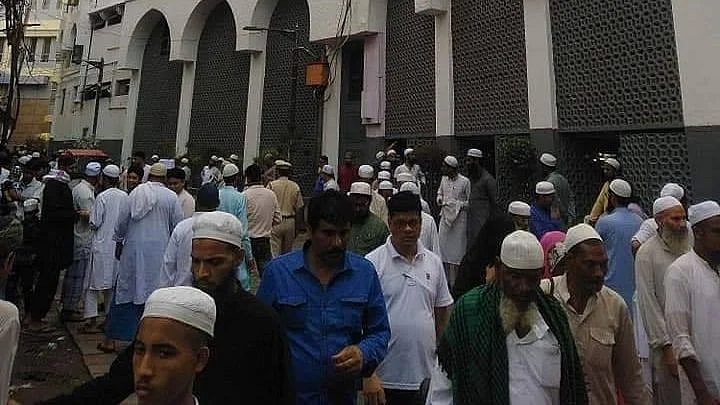The Tablighi Jamaat meeting held in New Delhi between 8 and 22 March has emerged as the biggest cluster of COVID-19 cases in India, spread across several parts of the country. The group is facing criticism for being irresponsible and negligent in the face of a global health pandemic, as they allegedly did not do enough to ensure the safety of their participants.
But while the group faces censure – rightly – for not taking enough measures, details emerging from several states show that the effect of this cluster could have been diminished if governments across India had identified the problem and analysed the situation correctly – and had simply talked to each other.
Cases of infection from this event now constitute around 20% of the total number of coronavirus patients in the country, a figure that could have been flattened earlier, if the available data had been scrutinised correctly.
And one of the main reasons for this failure, according to analysts, is the state governments’ insistence on looking at foreigners and foreign returnees – and their refusal to look at the possibility of local transmission.
Did Telangana Sound an Alert?
In fact, for Telangana, the warning signs came as early as 16 March, when a group of 10 Indonesians were rushed to the isolation ward at Hyderabad's Gandhi Hospital with symptoms of COVID-19. While one of them tested positive on 17 March, seven others were confirmed to have COVID-19 on 18 March. The group travelled in coach number S9 of AP Sampark Kranti Express (Train no 12708), boarding in Delhi on 13 March.
A senior official from Telangana told TNM on condition of anonymity,
“When the case came to light, immediately two things came to our mind: One, was that we were busy screening airports and that the group had managed to travel from within the country by train. And two, that it was a problem of foreign nationals who had come to Telangana.”
“We did not expect at the time that locals could also be carrying the disease," he admits.
Based on this incorrect conclusion – and ignoring the time spent by many Indians with these foreigners in a closed space – the Telangana government first started tracing other foreigners who attended the Tablighi Jamaat event.
And in this search, eight more Indonesians and 12 nationals from Kyrgyzstan were found in Hyderabad's Mallepally mosque, a centre of Tablighi activity in the city. None of them showed any symptoms of COVID-19 – but as a precautionary measure they were all sent into quarantine. Another group of 12 preachers from Tablighi Jamaat from Vietnam were traced in Nalgonda town. They, too, were quarantined.
But did Telangana inform other state governments and the Union government that so many COVID-19 patients had attended the Tablighi Jamaat meeting in Delhi? And did they also communicate that several hundreds of Indians had participated in the event? The answers to these questions are unclear.
According to a statement by the Press Information Bureau on 31 March, “The Union Ministry of Home Affairs (MHA) shared details of foreign and Indian Tablighi Jamaat (TJ) members in India with all states on 21 March 2020, after COVID-19 positive cases among these workers surfaced in Telangana. The swift action was taken with a view to identify, isolate, and quarantine TJ members who might be COVID-19 positive. Instructions were also issued by MHA to Chief Secretaries and Director Generals of Police (DGPs) of all states as well as the Commissioner of Police, Delhi. The advisories were reiterated by the DIB to all State DGPs on 28 and 29 March.”
This statement claims that the warning went from the union government to the state three days after Telangana confirmed eight Indonesians had tested positive. And despite this so-called ‘swift action’, many of the attendees took trains and planes back from Delhi on 23 and 24 March – after the janata curfew – when they should have been quarantined in the capital.
Moreover, a report in the Indian Express says that medical screening of those at the Markaz started only on 26 March.
Disconnect Within States Added to Chaos?
On 21 March, the Tamil Nadu government confirmed that two Thailand nationals – Patient 5 and Patient 6 – tested positive for coronavirus. They, too, had attended the event at New Delhi – but the state government, which has been very stingy when it comes to information sharing, did not reveal this information, allowing the assumption that they had travelled to India with the virus.
"If the Telangana government or the Union government had communicated on 18 March itself, Tamil Nadu could have reacted more vigorously," says a source in the Tamil Nadu CMO, "But there have been a lot of disconnects in communication between states and even within the state itself.”
“The Health Department was not working in tandem with Intelligence and police to immediately trace out contacts of the affected persons," he admits.
This ‘disconnect’ was compounded by Tamil Nadu’s initial denial around coronavirus, and the state’s refusal to do enough tests – or contact trace enough people.
On 17 March, a 49-year-old Thai national – also a participant of the Tablighi Jamaat in Delhi – died in Coimbatore. Concerningly, this person had been stopped by officials at the Coimbatore airport and quarantined – and had been allowed to leave after he tested negative for coronavirus. Was it a false negative? Did he die of COVID-19? We don’t know.
What we do know is that this Thai national was a contact of Patient 5 and 6 – the two other Thai nationals who are contacts of several COVID-19 patients in Erode and Coimbatore.
The state government traced the deceased man's contact to Erode on 21 March, where Patient 5 and Patient 6 were found with symptoms of COVID-19. Four days later, on 25 March, four other Indonesian nationals who attended the Delhi meeting tested positive at Salem.
By this time, according to health department sources, the Tamil Nadu govt was aware of the Tablighi link and they were trying to trace people who attended the meeting – however, without making it public.
"Intelligence had already traced the infection back to the Delhi meeting, as soon as the two Indonesian nationals were isolated. But initially the health department did not get this information and involve them in the contact tracing," says the source in the CMO.
It was finally on 30 March, that both Telangana and Tamil Nadu governments made public the Tablighi link and asked people to come forward and declare themselves. The Andhra government meanwhile asked the Jamaat members to declare themselves on 1 April and by 2 April, the state had 111 positive cases from among those who went to Nizamuddin.
So from 17 March, it took the Tamil Nadu government 14 days to finally warn its residents.
When questioned about this significant delay, Tamil Nadu Health Secretary Beela Rajesh, said in a press meet, “It was a very dynamic process. At the time that these people tested, we still had the trains and Tamil Nadu was the only state which started screening in trains and domestic airports," she said in the press conference on Wednesday.
"First the international flights stopped, but domestic trains and flights continued. It was not a single day conference to say it was a delay. It was something that happened over a period of time where people met from different states and different places, so we can't say it was delayed," she argued.
(This story was originally published in The News Minute and has been reposted with permission.)
(At The Quint, we question everything. Play an active role in shaping our journalism by becoming a member today.)




